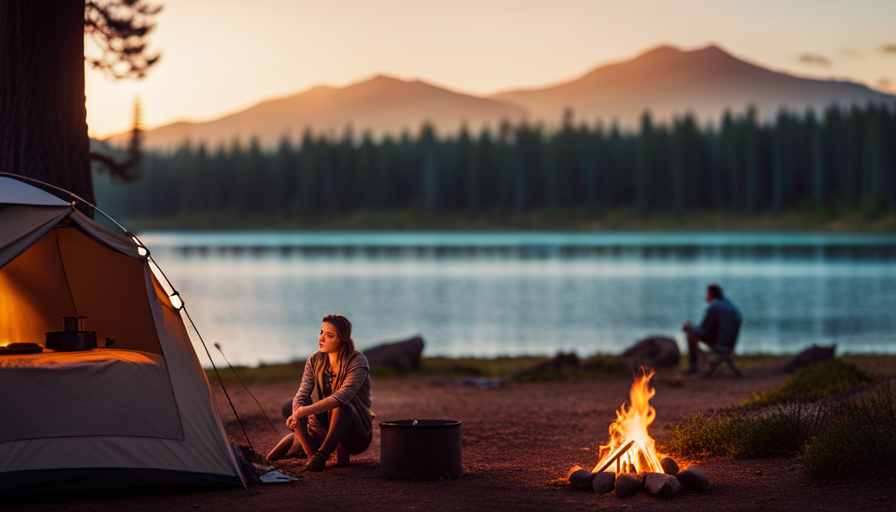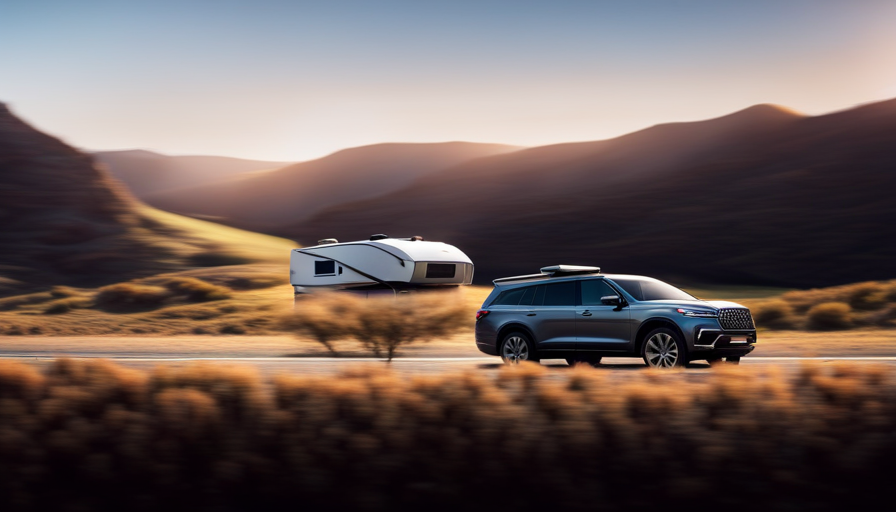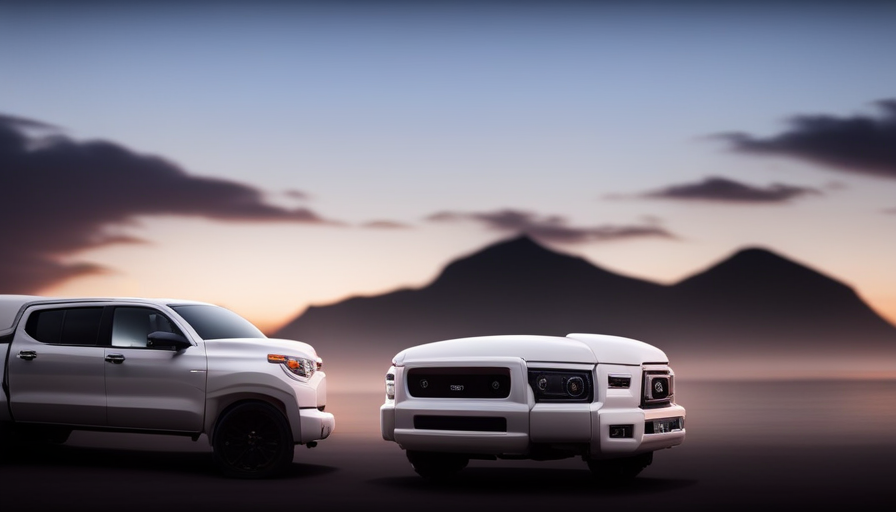Have you ever fantasized about a life spent roaming freely, discovering new locations, and greeting each day with stunning landscapes? Well, my fellow adventurers, I come bearing thrilling news for you.
In this article, we will delve into the world of camper living and explore the many incredible places where you can call your camper home.
From the majestic beauty of National and State Parks to the vibrant community of RV parks and campgrounds, the options are truly endless. Picture yourself nestled among towering trees, with a babbling brook just steps away, or waking up to the sound of crashing waves on a picturesque beach.
If you crave solitude, why not venture off the beaten path and find solace in off-grid and remote locations? Or perhaps you prefer a sense of community and choose to reside in mobile home parks or RV resorts.
Whether you’re a nature lover, beach bum, or thrill-seeker, there is a perfect spot out there for you to park your camper and make it your cozy home on wheels. So buckle up, my fellow adventurers, as we embark on a journey to discover the incredible places where you can live in a camper and make memories that will last a lifetime.
Key Takeaways
- National and State Parks, RV parks and campgrounds, renting land from property owners, and mobile home parks are all viable options for camper living.
- Camper living offers a minimalist lifestyle with the comforts of home, flexibility, and the ability to explore new places.
- Privacy, seclusion, connection with nature, and a sense of community are advantages of camper living in various settings such as farms and ranches, coastal areas, private properties, and vineyards.
- Upscale RV resorts, luxury campgrounds, and off-grid living provide unique experiences, opulent amenities, and the opportunity to discover remote locations.
National and State Parks
If you’re looking for a breathtaking and nature-filled experience, you can totally park your camper in the stunning National and State Parks across the country. These parks offer a unique opportunity to immerse yourself in the beauty of nature while enjoying the comforts of your own camper. Plus, they provide a range of amenities and activities to make your stay even more enjoyable.
One of the great things about parking your camper in National and State Parks is that it’s generally allowed under public land laws. However, it’s important to check the specific regulations of each park before you go to ensure you’re following all the rules. Most parks have designated camping areas where you can set up your camper, but there are also boondocking options available for those who prefer a more remote and off-the-grid experience.
Whether you choose to camp near a pristine lake, a towering mountain, or a lush forest, you’ll be surrounded by the wonders of nature. Wake up to the sound of birds chirping, hike scenic trails, and witness stunning sunsets right outside your camper door.
Now, let’s move on to the next section about RV parks and campgrounds, where you can find even more options for parking your camper and enjoying the great outdoors.
RV Parks and Campgrounds
While traveling across the country in our trusty RV, we stumbled upon a hidden gem nestled amongst the towering trees of a serene RV park. RV parks and campgrounds offer flexibility and convenience for those of us living in a camper. Whether it’s a short stay or a long-term arrangement, these parks provide a range of amenities to accommodate our needs.
Not only are RV parks and campgrounds budget-friendly options, but they also offer a sense of community. We’ve met fellow travelers and exchanged stories around the campfire, creating lasting connections. The parks often have laundry facilities, clean showers, and even Wi-Fi, making life on the road a little easier.
One of the benefits of staying in an RV park is the access to nature. Many parks are located in picturesque areas, allowing us to wake up to breathtaking views and explore nearby hiking trails. It’s the perfect way to disconnect from the hustle and bustle of city life and reconnect with nature.
As we continue our journey, we look forward to our next adventure on private land rentals, where we can experience a more secluded and personalized camping experience.
Private Land Rentals
When it comes to living in a camper, renting land from property owners provides us with the perfect solution. Not only does it give us the flexibility and freedom to choose our location, but it also allows us to enjoy the privacy and seclusion that comes with living on private land.
Renting land from property owners gives us the opportunity to create our own little piece of paradise, where we can truly embrace the nomadic lifestyle.
Renting Land from Property Owners
One option for living in a camper is to rent land from property owners. This can be a great way to have a place to park your camper and live comfortably. Some property owners may even offer amenities such as access to water and electricity hookups, making the living arrangement even more convenient. However, it’s important to be aware of potential issues that can arise when living in a camper, such as identifying mold smells in campers. Regularly inspecting and cleaning your camper to prevent mold growth is essential for maintaining a healthy living environment.
Some property owners may offer spaces specifically for campers, while others may be more open to the idea of renting out a portion of their land for this purpose.
Renting farmland is a popular choice for those who want a more rural experience, with wide open spaces and beautiful views. On the other hand, urban parking lots can provide a convenient location close to amenities and services.
Renting land from property owners offers flexibility and freedom, allowing you to choose the location that best suits your needs and preferences. It provides an opportunity to create your own little home on wheels and explore new places.
Flexibility and Freedom
You’ll love the flexibility and freedom that comes with renting land from property owners. It allows us to have a minimalist lifestyle while still enjoying the comforts of home in our camper. One of the main benefits is the flexible work opportunities it provides. Since we can park our camper wherever we want, we have the freedom to explore different areas and take advantage of job opportunities that may not be available in a traditional living situation.
Another advantage is the ability to live a more sustainable lifestyle. We can easily connect with nature and reduce our carbon footprint by choosing locations that are close to hiking trails, lakes, and forests.
Lastly, renting land from property owners allows us to enjoy privacy and seclusion. We can find remote spots where we can truly disconnect from the outside world and immerse ourselves in the beauty of nature.
Transitioning into the next section, we’ll explore how this lifestyle also provides us with a sense of privacy and seclusion.
Privacy and Seclusion
After exploring the advantages of living in a camper, let’s delve into another enticing aspect: privacy and seclusion.
One of the greatest perks of camper living is the ability to find secluded camping spots and hidden retreats that offer a sense of tranquility and escape from the bustling world. Imagine waking up to the sounds of nature, surrounded by towering trees and breathtaking landscapes, with no other human presence for miles.
These hidden gems can be found in various locations, from remote national parks to off-the-beaten-path wilderness areas. Whether you prefer mountains, forests, or coastal settings, there is a secluded spot waiting for you to discover and call home.
Now, let’s move on to the next section where we will explore the vast opportunities for camper living in public lands and wilderness areas.
Public Lands and Wilderness Areas
Surrounded by breathtaking natural landscapes, public lands and wilderness areas offer the perfect haven for camper dwellers. National forests and desert areas are among the prime locations where one can live in a camper while enjoying the beauty and tranquility of nature.
National forests, such as the stunning and expansive ones found in the United States, provide endless opportunities for exploration and solitude. With their vast stretches of land and diverse ecosystems, these forests offer campers the chance to immerse themselves in nature and experience the thrill of waking up to the sound of birds chirping and leaves rustling. Whether it’s hiking through lush green forests or fishing in crystal-clear lakes, national forests provide a truly immersive camping experience.
For those who prefer the arid beauty of desert landscapes, there are numerous desert areas that welcome camper dwellers. These vast expanses of sand and rock offer a unique sense of isolation and serenity. Imagine parking your camper amidst towering sand dunes or beneath a star-studded sky, with only the sound of the wind as your companion.
Public lands and wilderness areas, including national forests and desert areas, offer camper dwellers an unparalleled opportunity to connect with nature and find solace in their surroundings. As we transition to the next section about mobile home parks, it’s important to note that while public lands provide privacy and seclusion, mobile home parks offer a different kind of community and convenience.
Mobile Home Parks
After exploring the vast possibilities of public lands and wilderness areas, we now turn our attention to another option for living in a camper: mobile home parks. These unique communities offer a convenient and often affordable solution for individuals seeking a place to park their mobile homes and enjoy a sense of community.
Mobile home parks, also known as mobile home communities or mobile home villages, are designed specifically for individuals who want to live in a camper or mobile home. These parks typically provide amenities such as laundry facilities, recreational areas, and sometimes even swimming pools. Many mobile home parks also offer on-site management and maintenance, ensuring a safe and well-maintained living environment.
Living in a mobile home park can provide a sense of community and camaraderie. Neighbors often form close-knit bonds, organizing events and activities that foster a sense of belonging. Additionally, mobile home parks are often conveniently located near shopping centers, restaurants, and other amenities, making it easy to access the necessities of daily life.
As we delve into the next section about farms and ranches, we will discover yet another intriguing option for those seeking a unique and unconventional living arrangement.
Farms and Ranches
Nestled amidst sprawling fields and grazing livestock, farms and ranches offer a picturesque and idyllic setting for those seeking an unconventional way of life. Living in a camper on a farm or ranch provides the perfect opportunity to immerse oneself in nature and experience the tranquility of off-grid and remote locations.
Imagine waking up to the sound of roosters crowing and stepping outside to breathe in the crisp country air. Farms and ranches often have ample space for campers, with wide open fields and scenic views that stretch for miles.
Living on a farm or ranch allows you to connect with the land and embrace a simpler way of life. You can witness the daily workings of a functioning farm, from tending to crops and caring for animals to harvesting fresh produce. Whether you choose to help out or simply observe, the experience will be enriching and educational.
In addition to the natural beauty and peacefulness, farms and ranches offer a sense of community. You may have the opportunity to meet and interact with like-minded individuals who are also living in campers or working on the farm. Social gatherings, shared meals, and a strong sense of camaraderie are often part of the farm life experience.
As we transition to the subsequent section about beaches and coastal areas, it’s important to note that these serene and rustic farmlands are just one of the many options available for camper living.
Beaches and Coastal Areas
With their sun-kissed shores and rhythmic waves, beaches and coastal areas beckon with an irresistible allure, offering a chance to bask in the salty sea breeze and embrace the endless possibilities of a coastal lifestyle. Whether it’s the charm of island living or the vibrant atmosphere of coastal communities, there are numerous options for living in a camper along the coast.
To fully enjoy the coastal experience, here are three things you shouldn’t miss:
-
Explore pristine beaches: From secluded coves to expansive stretches of sand, coastal areas boast breathtaking beaches waiting to be discovered. Feel the sand between your toes as you stroll along the shoreline, take a refreshing dip in the crystal-clear waters, or simply relax and soak up the sun.
-
Engage in water sports: Coastal living offers an abundance of thrilling water activities. Whether you’re into surfing, paddleboarding, or kayaking, the coastal areas provide the perfect playground for water enthusiasts of all levels. Dive into the waves, ride the swells, and experience the exhilaration of the ocean firsthand.
-
Indulge in local flavors: Coastal communities are known for their fresh seafood and vibrant culinary scenes. Savor the catch of the day at local seafood shacks, enjoy beachside barbecues, or discover hidden gems serving up coastal cuisine. Immerse yourself in the flavors of the coast and experience the unique culinary culture these areas have to offer.
As we transition to the next topic of campsites on private property, let’s explore how you can find your perfect coastal spot to park your camper and continue your adventure.
Campsites on Private Property
After exploring the breathtaking beaches and coastal areas where we can park our camper, let’s now dive into another exciting option: campsites on private property. This is an excellent alternative for those who desire a more secluded and intimate camping experience.
Renting farmland for camping is a growing trend among campers seeking peace and tranquility. Picture yourself waking up to the soft rustling of leaves, surrounded by vast open fields and rolling hills. With permission from the landowner, you can set up camp and indulge in the beauty of nature.
For wine enthusiasts and nature lovers alike, camping in vineyards is an absolute dream come true. Imagine parking your camper amongst rows upon rows of lush grapevines, with the sweet scent of ripening grapes filling the air. Not only will you have a unique camping experience, but you can also partake in wine tastings, vineyard tours, and even help with grape harvesting if you’re up for it.
As we venture further into the realm of camper living, let’s move on to our next stop: RV resorts. Here, we’ll discover luxurious amenities, vibrant communities, and endless opportunities for relaxation and adventure. Get ready to immerse yourself in the world of comfort and leisure as we explore the wonders of RV resorts.
RV Resorts
At RV resorts, we can enjoy luxurious amenities and services that make our camping experience truly exceptional. From swimming pools and hot tubs to fitness centers and golf courses, these resorts offer everything we need to relax and have fun.
Additionally, they organize social activities and events, such as BBQ parties and live performances, creating a lively and vibrant community. With upscale RV living, we can enjoy the best of both worlds – the freedom of camping and the comfort of a high-end resort.
Luxurious Amenities and Services
Imagine living in a camper that offers an array of opulent amenities and services, transforming your nomadic lifestyle into a luxurious retreat on wheels. Luxury campgrounds cater to those seeking a high-end experience, providing an abundance of amenities that rival traditional resorts.
Picture waking up in your cozy camper, stepping outside to a pristine swimming pool and jacuzzi, surrounded by lush landscaping and lounge chairs. After a relaxing morning, indulge in a spa treatment or workout at the state-of-the-art fitness center.
As the sun sets, gather with fellow campers for a gourmet meal prepared by a renowned chef at the on-site restaurant. These luxury campgrounds go beyond the basics, offering services like concierge assistance, laundry facilities, and even pet grooming.
With all these exquisite amenities at your fingertips, living in a camper becomes an extraordinary adventure.
Transitioning seamlessly into the next section, let’s now explore the vibrant social activities and events that await you.
Social Activities and Events
Get ready to immerse yourself in a vibrant social scene filled with exciting activities and events at these luxury campgrounds. Here, you won’t just be sitting around in your camper all day – there’s a whole world of outdoor sports waiting for you. Whether you’re into hiking, biking, or kayaking, these campgrounds offer a wide array of options to get your adrenaline pumping.
You can join group hikes through scenic trails, participate in competitive bike races, or even go fishing in the nearby lakes. But the fun doesn’t stop there. These campgrounds also host cultural festivals that celebrate the local heritage and traditions. From music and dance performances to art exhibitions and culinary delights, there’s always something happening to keep you entertained.
As you venture into the next section about upscale RV living, you’ll discover even more amazing features that make these campgrounds the ultimate choice for luxury living on the go.
Upscale RV Living
Step into a world of luxury and embrace the freedom of a mobile sanctuary, where your RV becomes a five-star hotel on wheels, whisking you away to new adventures and horizons.
In upscale RV communities and luxury RV parks, you’ll find amenities and services that rival those of high-end resorts. Immerse yourself in beautifully landscaped surroundings, complete with swimming pools, fitness centers, and gourmet restaurants. Indulge in spa treatments or unwind by the fire pit, surrounded by fellow RV enthusiasts who share your love for the finer things in life.
These exclusive communities offer a sense of community and camaraderie, with organized social activities and events. But if you’re looking to venture off the beaten path, don’t worry! There are plenty of off-grid and remote locations waiting to be discovered, where you can truly disconnect and reconnect with nature.
Off-grid and Remote Locations
Living off-grid and in remote locations can be an incredible adventure for those looking to embrace camper life. It offers a chance to disconnect from the hustle and bustle of everyday life and immerse yourself in the beauty of nature. Here are four reasons why off-grid living and remote travel can be a dream come true:
-
Peace and tranquility: Imagine waking up to the sound of birds chirping and the gentle rustling of leaves. Living off-grid allows you to experience a level of peace and tranquility that is hard to find in the city.
-
Stunning landscapes: From lush forests to breathtaking mountains, off-grid living allows you to wake up to some of the most stunning landscapes the world has to offer. Each day is an opportunity to explore new and awe-inspiring scenery.
-
Self-sufficiency: Living off-grid means relying on your own resources. It’s a chance to learn new skills, such as solar power generation and water conservation. The feeling of self-sufficiency is incredibly empowering.
-
Adventure and freedom: Off-grid living allows you to roam freely and explore remote locations that are inaccessible to traditional housing. You can chase the perfect sunset, discover hidden gems, and forge your own path.
So, if you’re ready to embrace a life of off-grid living and remote travel, grab your camper and embark on the adventure of a lifetime. The world’s waiting for you to explore its hidden wonders.
Frequently Asked Questions
Can I live in a camper full-time in a national or state park?
Living in a camper full-time in a national or state park can be an appealing adventure! However, regulations vary depending on the park.
While some national parks offer campgrounds specifically for RVs, others may have restrictions on long-term stays. State parks also have different rules, with some allowing extended stays and others limiting the duration.
It’s crucial to research and contact the specific park you’re interested in to ensure you’re aware of their regulations and availability for camper living.
Are there any restrictions on living in a camper in an RV park or campground?
There are certain restrictions and regulations that apply when living in a camper in an RV park or campground. These restrictions vary depending on the specific location, so it’s important to research and understand the rules of each place before making any long-term plans.
Some common restrictions may include limitations on the length of stay, rules regarding pets, quiet hours, and guidelines for waste disposal. By familiarizing yourself with these regulations, you can ensure a smooth and enjoyable experience while living in your camper.
How can I find private land rentals that allow living in a camper?
Finding land for camper living can be like searching for hidden treasure. Renting private land for camper living allows us the freedom to roam and settle down in unique and picturesque locations.
To embark on this adventure, one can start by exploring online platforms specializing in land rentals. These platforms connect landowners and campers seeking a temporary home, offering a wide range of options to suit our preferences.
With a little research and a touch of wanderlust, we can discover our perfect oasis to call home.
What are the rules and regulations for living in a camper on public lands and wilderness areas?
Living in a camper on public lands, such as BLM or Forest Service land, requires knowledge of the rules and regulations. On BLM land, dispersed camping is generally allowed for up to 14 days, but longer stays may require a permit.
Forest Service land also allows dispersed camping, but specific restrictions vary by location. It’s important to respect the environment, pack out all trash, and be aware of fire restrictions. Researching specific guidelines for the area you plan to visit is essential.
Are there any specific requirements or limitations for living in a camper in a mobile home park?
Living in a camper in a mobile home park comes with specific requirements and limitations. Each park may have its own set of rules regarding the type and size of campers allowed, as well as regulations on appearance and maintenance.
Some parks may require a minimum stay or have restrictions on the number of occupants. It’s important to research and contact the specific mobile home park you’re interested in to learn about their specific requirements and limitations.
What Are the Best Places to Live in a Camper Year-Round in Michigan?
When it comes to living in michigan camper year-round, there are several amazing places to consider. Traverse City offers stunning views of Lake Michigan, coupled with a vibrant arts and food scene. Sleeping Bear Dunes National Lakeshore allows you to wake up surrounded by nature’s beauty. For a quaint experience, Mackinaw City offers campgrounds with easy access to Mackinac Island. When in Michigan, these places offer unforgettable experiences for those embracing the lifestyle of living in a camper year-round.
Conclusion
So, if you’re looking for a unique and adventurous way to live, living in a camper can be a great option.
There are plenty of places where you can set up camp and call it home. From national and state parks to RV parks and campgrounds, private land rentals to public lands and wilderness areas, there are endless possibilities.
You can even find campsites on private property or explore off-grid and remote locations.
So go out there, explore, and create your own little slice of paradise on wheels!










